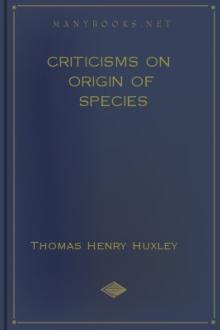author - "Thomas Henry Huxley"

in a Norse Saga as where they are; and if the varnish-brush of later respectability has passed over these memoirs ofthe mighty men of a wild age, here and there, it has notsucceeded in effacing, or even in seriously obscuring, theessential characteristics of the theology traditionally ascribedto their epoch.There is nothing that I have met with in the results of Biblicalcriticism inconsistent with the conviction that these books giveus a fairly trustworthy account of Israelitic life and

all the parts of thewatch to the function, or purpose, of showing the time, is held to beevidence that the watch was specially contrived to that end; on theground, that the only cause we know of, competent to produce such aneffect as a watch which shall keep time, is a contriving intelligenceadapting the means directly to that end.Suppose, however, that any one had been able to show that the watch hadnot been made directly by any person, but that it was the result ofthe modification of another

t instigated by love of knowledge]In fact, the history of physical science teaches (and we cannot too carefully take the lesson to heart) that the practical advantages, attainable through its agency, never have been, and never will be, sufficiently attractive to men inspired by the inborn genius of the interpreter of nature, to give them courage to undergo the toils and make the sacrifices which that calling requires from its votaries. That which stirs their pulses is the love of knowledge and

in a Norse Saga as where they are; and if the varnish-brush of later respectability has passed over these memoirs ofthe mighty men of a wild age, here and there, it has notsucceeded in effacing, or even in seriously obscuring, theessential characteristics of the theology traditionally ascribedto their epoch.There is nothing that I have met with in the results of Biblicalcriticism inconsistent with the conviction that these books giveus a fairly trustworthy account of Israelitic life and

all the parts of thewatch to the function, or purpose, of showing the time, is held to beevidence that the watch was specially contrived to that end; on theground, that the only cause we know of, competent to produce such aneffect as a watch which shall keep time, is a contriving intelligenceadapting the means directly to that end.Suppose, however, that any one had been able to show that the watch hadnot been made directly by any person, but that it was the result ofthe modification of another

t instigated by love of knowledge]In fact, the history of physical science teaches (and we cannot too carefully take the lesson to heart) that the practical advantages, attainable through its agency, never have been, and never will be, sufficiently attractive to men inspired by the inborn genius of the interpreter of nature, to give them courage to undergo the toils and make the sacrifices which that calling requires from its votaries. That which stirs their pulses is the love of knowledge and